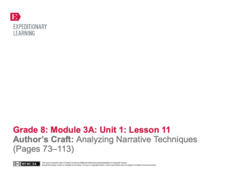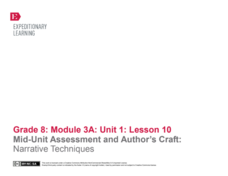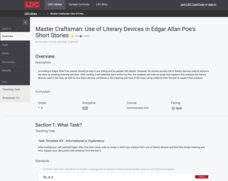EngageNY
Author’s Craft: Analyzing Narrative Techniques (Pages 73–113)
Scholars discuss a reading selection in Unbroken by writing to a partner about text selection. After completing the writing, learners revisit the use of active and passive sentences by reviewing a second Active and Passive Sentences...
EngageNY
Mid-Unit Assessment and Author’s Craft: Narrative Techniques
Scholars work together to compile a list of things good writers do to perfect their craft and write the ideas on a whiteboard. They then discuss the differences between passive and active sentences and use their knowledge to identify...
EngageNY
Launching The Performance Task: Building Background Knowledge: “War in the Pacific,” Part 1
It's all about a bit of give and take. Scholars silently read War in the Pacific and circle any unfamiliar words. Using context clues, they write each word on a strip of paper along with the inferred definition. After looking the word up...
EngageNY
Close Reading: Louie’s Change of Heart
Scholars read additional pages in Unbroken to discover more about Louie's character. Readers use turn-and-talk strategies to discuss character traits that describe Louie. They then answer text-dependent questions and cite evidence to...
EngageNY
Analyzing Character: Louie Zamperini
Let's talk! Scholars create discussion appointments using map locations. After completing their appointment books, readers look closely at a few Unbroken pages. They use sentence strips to record details from their readings that help...
EngageNY
Examining How Word Choice Contributes to Tone and Meaning: Close Reading of “Wet and Crying”
Scholars participate in a Write-Pair-Share activity while answering questions about the meaning of words in "Wet and Crying." They use their Write-Pair-Share note-catchers to guide their thoughts and then share with the class. After...
California Education Partners
Bud Not Buddy
A two-day assessment challenges scholars to read an excerpt from the story, Bud Not Buddy by Christopher Paul Curtis then complete a series of exercises in preparation for a writing assignment. Day one includes an independent reading...
EngageNY
Comparing Meaning and Tone: The Fall of Saigon in Fiction and Informational Text
Who's that talking to? Readers listen to a reading of the "Forgotten Ship" transcript and answer questions focusing on word meaning and choice. They complete a chart to track the multiple narrators in the script. For homework, readers...
EngageNY
End of Unit Assessment: How Word Choice Contributes to Tone and Meaning
It's finally time for pupils to show what they know! Scholars finalize the unit with an end-of-unit assessment. They use the book Inside Out & Back Again and the "Forgotten Ship" transcript to examine word choice, tone, and...
EngageNY
Building Background Knowledge: Vietnam as a “Battleground in a Larger Struggle”
Read. Stop. Think. Scholars use a reading strategy to process the challenging text, "The Vietnam Wars." They read a paragraph and then stop to think about the text and its meaning. Readers then go on to work with partners and make notes...
EngageNY
Jigsaw to Analyze Mood and Tone in To Kill a Mockingbird (Chapter 8)
We have an appointment! Scholars meet with another discussion appointment to discuss the text structure of the poem "Incident" by Countee Cullen. They use a Note Catcher to guide their thinking and compare the structure to chapter 8 of...
EngageNY
Inferring About Character: Atticus (Chapter 5)
As part of their study of Harper Lee's To Kill a Mockingbird, class members participate in a silent discussion of the novel using a Chalk Talk chart. They then respond to the teacher's questions by writing their thoughts on the chart....
EngageNY
Analyzing How Literature Draws on Themes from the Bible and World Religions: The Golden rule (Chapter 3)
Scholars use their Golden Rule Note-catcher to examine passages from To Kill a Mockingbird. They then take a gallery walk to compare and contrast the quotes before sharing Think-Write-Pair-Share ideas on how the quotes demonstrate the...
EngageNY
Close Reading: Focusing on Taking a Stand (Chapter 2 cont.)
Scholars complete a close read of To Kill a Mockingbird and determine why characters take a stand. They use text-dependent questions and Note-catchers to help guide their thinking. Readers review the Taking a Stand Anchor chart and...
EngageNY
Building Background Knowledge: The Impending Fall of Saigon
Scholars read "Doc-Lap at Last" and participate in a Three Threes in a Row activity in which they answer three questions about the text in their rows. They then discuss the central idea of the text. Readers finish the lesson plan with a...
EngageNY
Building Background Knowledge: Small-Group Work to Learn More about the History of Wars in Vietnam
Scholars take a close look at "The Vietnam Wars." They answer questions and discuss in groups to conclude that the author respects the Vietnamese. They participate in a modified jigsaw discussion and end the exercise with a quick writing...
EngageNY
Building Background Knowledge: Guided Practice to Learn about the History of Wars in Vietnam
Scholars use a map of Asia to help them better understand the article "The Vietnam Wars," focusing on word meaning in the title and subtitle. Learners then use guided notes while reading the article and discuss their ideas with partners.
Literacy Design Collaborative
Words Matter: Diction and Orwell's "Shooting an Elephant"
Watch your tone! Scholars analyze how diction in George Orwell's Shooting an Elephant contributes to the tone of the text. Readers watch a video, participate in a word splash, and work through a PowerPoint lesson to help them determine...
Florida Center for Reading Research
Vocabulary: Word Meaning, Dictionary Cube
Scholars work together to define words and answer questions using a dictionary cube.
Florida Center for Reading Research
Vocabulary: Morphemic Elements, Rooting for Meaning!
Scholars work with root and meaning cards to build vocabulary skills. Playing with a partner, learners read a root, locate its meaning, and cover it with a counter. The first player to cover their board wins.
Literacy Design Collaborative
Master Craftsman: Use of Literary Devices in Edgar Allan Poe's Short Stories
Make the writing process a breeze for literary lovers. Scholars identify literary elements in Poe's The Tell-Tale Heart. They then choose their own short story from Edgar Allan Poe and repeat the processes independently. The final...
Good Project by Harvard Project Zero
The Good Project Lesson Plans
Excellence, ethics, and engagement are the three E's featured in a unit that promotes good work among elementary scholars. Through discussion, reflection, read-alouds, activity worksheets, and written responses, participants gain...
Curriculum Corner
Sports of All Sorts
Do your students love sports? Do they love math and reading? If the first answer is yes and the second is no, a resource with sports-themed math and literacy games may change their minds! Learners move through stations to practice...
Read Write Think
Poetry Portfolios: Using Poetry to Teach Reading
Over the course of five periods, scholars create a poetry portfolio. They begin with a reading of the poem, Firefly. With a focus on vocabulary, learners reread the poem then look for sight words and other skills.

























